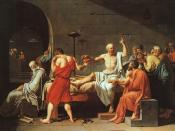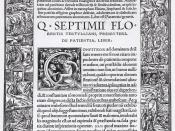PAGE 3
In Plato's Phædo, Socrates offers four arguments for the immortality of the soul. In this analysis, we will be exploring the "Argument from Opposites," which is also known sometimes as the "Cyclical Argument," and finding ways in which it does not hold true, if any, and offering any ideas that may strengthen the argument.
Socrates begins by telling his friends, "I am likely to be right to leave you and my masters here without resentment or complaint, believing that there, as here, I shall find good masters and good friends" (69d-69e). What Socrates says here is that he is not worried about dying because he thinks that he will also find good friends and masters in the afterlife. Right after, Cebes mentions how many people do not believe in the afterlife and that "they think that after [the soul] has left the body it no longer exists anywhere, but that it is destroyed and dissolved on the day the man dies" (70a).
This is when Socrates begins to introduce his "Argument of Opposites" to back up his theory of an immortal soul and to do so, he "examine[s] whether those that have an opposite must necessarily come to be from their opposite and from nowhere else" (70e). Now Socrates begins his comparison between things opposite in nature by saying that you could not have one without the other. A great example of this is "when something comes to be larger it must necessarily come to be from having been smaller before" (70e). This makes sense when applied to real things. For example, say you are given a healthy plant on day X and take the height of the plant. In the future, on day Y, you measure the plant again and find the height is greater than on...


